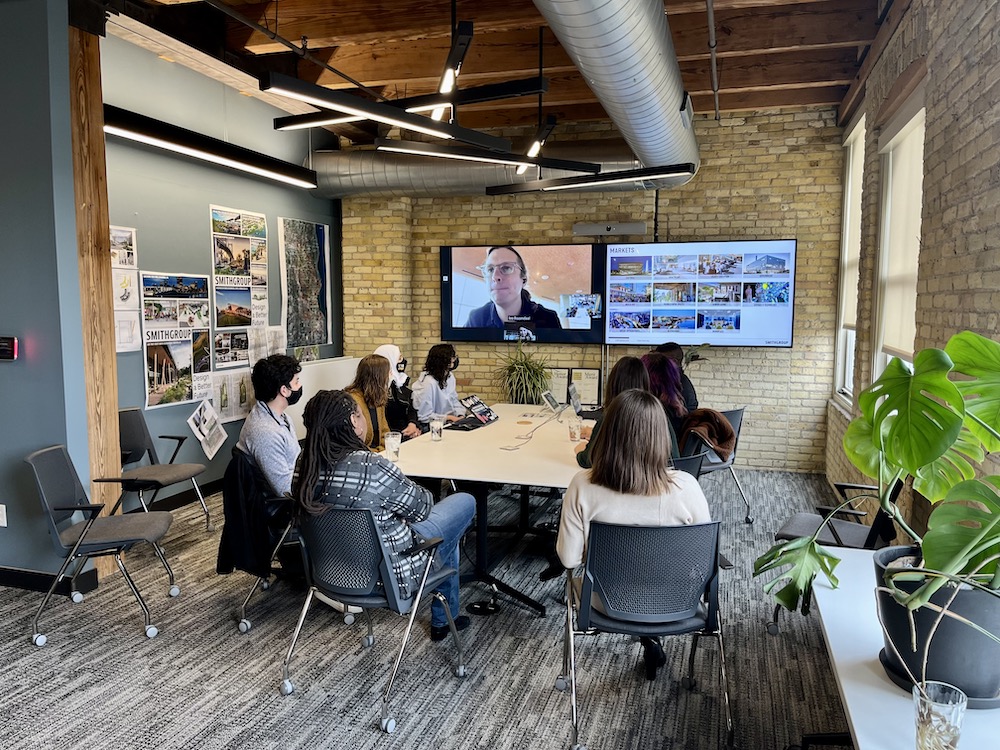[ad_1]
SmithGroup’s Deborah Nemeth and Megan Skaalen discover the non-public {and professional} targets that drive Gen Z and the way this may impression the way forward for work.
As Era Z—these born between 1997 and 2012—begins to enter the workforce, firms are realizing their present workplace areas, operational insurance policies, and firm norms don’t resonate as strongly with this rising worker base as they did with these of a long time previous. With the primary wave of Era Z getting into the workforce in the course of the COVID-19 pandemic, they by no means skilled pre-pandemic office life. In response, organizational leaders are working to higher perceive the distinctive wants and wishes of this soon-to-be very giant and influential demographic group. As a part of an inside analysis initiative centered on this matter, SmithGroup’s Office Apply convened panels of Gen Z staff in Detroit, Michigan and Chicago, Illinois to study extra concerning the private {and professional} targets that drive this era.

Earlier than we dive into takeaways from the panel discussions, let’s cowl a couple of notable information: In accordance with the U.S. Census Bureau and an article printed by Bloomberg, Gen Z includes 20.3% of the U.S. inhabitants, placing it neck-and-neck with Millennials at 22%. Worldwide, Gen Z has surpassed Millennials as the most important era, accounting for 32% of the worldwide inhabitants. The values, mindsets and behaviors that outline this era have been considerably formed by a number of key elements together with the group’s deep connection to know-how and social media, the globalization of the world economic system and the COVID-19 pandemic. Gen Z has additionally come of age whereas the world faces a few of the best environmental, social and financial crises in historical past. And this era has no hesitation in confronting a problem, elevating their voice and calling for change.
So, what does this imply for the way forward for work? Let’s dive into the 5 key aspirations and drivers we’ve uncovered from this era:
- Facilities, Advantages & Wage: A Shifting Mindset
- Private & Skilled Values are One within the Identical
- Digital, In-Individual & Hybrid Work: Steadiness is Key
- Expertise & Flexibility Reign
- Coaching & Improvement: One Measurement Does Not Match All
Facilities, Advantages & Wage: A Shifting Mindset
Let’s begin with the underside line. Our group of panelists confirmed that Gen Z is motivated by way over cash. Whereas wage stays an necessary issue, a examine performed by Deloitte reveals that Gen Z values wage lower than each different era. Given a selection of accepting a better-paying but boring job versus work that was extra fascinating however didn’t pay as nicely, Gen Z was evenly cut up over the selection.
Past pay, advantages comparable to paid day without work, psychological well being days and actions that create a way of group are important for Gen Zers. When seeking to entice and retain expertise, organizations should take into account what they will provide to encourage a wholesome way of life, promote private wellbeing, and preserve a powerful work-life steadiness. Distinctive choices are seen as an enormous plus to this group, they carry extra than simply what they will accomplish in an eight-hour workday. For instance, SmithGroup offers staff an extra 15 Fridays off every year, on prime of an worker’s normal PTO choices. Our HR managers affirm this distinctive differentiator tremendously impacts candidates’ choices. Different widespread differentiators talked about within the panels embody paid fitness center memberships, commuter advantages, entry to pet insurance coverage, and customized care packages, to call a couple of.
Private & Skilled Values are One within the Identical
Private {and professional} values are intertwined and inseparable within the Gen Z world. Gen Zers put work-life steadiness and private wellbeing above all different elements that affect their decision-making processes, in work and throughout all walks of life. Not like previous generations, revenue and model popularity are far much less necessary to this group.
In accordance with the World Financial Discussion board (WEF), most of Gen Zers usually are not against a company job—they’re simply not as possible as different generations to make compromises for a company that doesn’t match their values. Given the significance that this era locations on autonomy and work-life steadiness, about half of these surveyed by WEF report that they’d stop their job if it interfered with their work-life steadiness. Moreover, a latest examine sampling 35,000 employees throughout 34 markets discovered that nearly two in 4 Gen Z people would like to be unemployed over being caught in a job they don’t like.
We’re not simply employees with our heads down,” stated one panelist. “We’re social beings, we want socialization and wish to have steadiness in our lives.
Furthermore, allow us to not overlook the significance that this era locations upon group, ethics, and equality. Corporations seeking to entice and retain Gen Z employees want to spotlight their efforts nearly as good international residents—demonstrating their strategy to a broad set of societal challenges comparable to sustainability and local weather change in addition to efforts targeted on justice, fairness, range, and inclusion. In accordance with a 2022 Lever report, 42% of Gen Zers would slightly be at an organization that offers them a way of objective than one which pays extra. They’re additionally extra possible than the typical American to wish to work for an organization that takes a stance in addressing necessary international, societal, and environmental points.

Digital, In-Individual & Hybrid Work: Steadiness is Key
Whereas SmithGroup’s Gen Z panelists all lauded the advantages of and want to work nearly in some capability, all agreed that going utterly digital will not be the perfect strategy. Relatively, the group expressed a choice for a hybrid strategy to work. This was in step with latest analysis by Asana, which signifies that 68% of Gen Z needs hybrid work.
The group agreed that working in-person permits individuals to create significant relationships and emphasised the worth that comes from working face-to-face, like with the ability to expertise and course of emotional reactions or facial expressions. There was additionally a consensus amongst panelists that in-person work is extra helpful to development and improvement because it permits for higher communication and an total richer work expertise. Most panelists stated they like being within the workplace two or three days every week and that being in an workplace setting makes them really feel extra related to the work. Some want a set schedule, whereas others want to be extra versatile relying on the day’s work and actions. They need their in-office days to capitalize on interacting with as many teammates and friends as potential. This sentiment echoes factors shared by Rebecca Hinds in a latest article authored for Inc.—“Gen Zs don’t need unbridled hybrid work—they need structured hybrid work.”
I positively really feel like I develop extra once I’m within the workplace. I acknowledge that if I would like my profession trajectory to proceed to go up, if I wish to proceed to develop personally and professionally, then I have to exert the hassle to return into the workplace extra continuously. That’s a private resolution that I have to make for myself.
Expertise & Flexibility Reign
Gen Zers are getting into the workforce with an unbelievable information of know-how and are comfy with high-level packages which can be essential at any office. It wasn’t a shock to study that many Gen Zers consider whether or not or not they wish to work for a company based mostly upon the agency’s technological capabilities.
Gen Zers are in search of versatile, open-minded, future-focused companies which can be fluid with know-how and are prepared to proceed to adapt new platforms and instruments to proceed to propel the group and its staff ahead.

Whereas technologically savvy, panelists shared they usually want to hunt enter or ask questions in individual or by way of a cellphone name versus chatting or emailing. Having an precise dialog appears far superior to the back-and-forth nature of IM-ing or emailing. That stated, panelists additionally shared that they discover it uncomfortable initiating dialogue with others. One cause for this hesitance that surfaced a number of instances was a common feeling that they’re behind the curve professionally resulting from pandemic disruptions. As such, they concern that partaking extra seasoned group leaders with questions will forged a destructive mild on their capabilities in colleagues’ eyes.
Concerning flexibility, this want doesn’t finish at distant vs. in-office work. As soon as Gen Zers enter the workplace, flexibility within the area design will not be solely desired however anticipated. Not like the generations earlier than them, Gen Z has skilled studying and improvement in way more intriguing and versatile areas. The first, secondary and school/college environments this era skilled provided areas for a wide range of wants—not simply teacher-centered instruction like previous generations skilled. As such, they need extra out of their office than a regular cubicle. Providing staff a number of typologies in activity-based work settings, hackable areas which might simply be reconfigured, seamless know-how connection, whereas additionally creating locations for respite and human connection is paramount.

Coaching & Improvement: One Measurement Does Not Match All
With regards to digital studying, panelists reported that digital coaching packages which embody layered approaches and strategies—comparable to a prescribed listing of on-demand studying segments, adopted by teammate-led distant tutorials with back-and-forth display sharing capabilities enabled—could be fairly profitable for each onboarding and coaching.
Apparently, some Gen Z teammates felt that, in relation to working with new or superior software program platforms, the digital studying state of affairs described above was usually most well-liked to in-person studying. The streamlined strategy gives a higher alternative to expertise instruments and capabilities and faster understanding of this system. With that, Gen Zers nonetheless acknowledge that working within the workplace can assist additional develop their skillsets.
You assume you recognize sure issues a few explicit software program platform, till you get within the workplace and folks train you suggestions and tips that make the work simpler and make it easier to be extra productive. Sitting subsequent to somebody sharing that information goes a protracted technique to strengthening your technical expertise. This information sharing isn’t transferred as simply whereas working remotely.

What We’ve Realized: From A to Z
As one panelist merely put it:
It’s straightforward to remain residence. Staff want a cause to return into the workplace a few times every week.
A couple of years in the past, accepting a job that required being current within the workplace 5 days every week was the norm. At the moment, many Gen Zers, particularly the youthful aspect of the era, know that they will productively work at home. Pair that with rising bills, growing fuel costs, time misplaced to commuting, and so forth. and nearly all of job candidates received’t even take into account taking a job that doesn’t provide hybrid capabilities.
As firms strategize one of the best ways to draw and retain Gen Z, do not forget that genuine, globally acutely aware organizations that embrace flexibility, work-life steadiness, wellbeing, connecting as individuals, and seamless integration of superior applied sciences can have the best enchantment. If firms overlook these core drivers and distinctive generational wishes, attracting and retaining Gen Z staff will likely be an uphill battle. The competitors is fierce, and this era received’t hesitate in in search of greener pastures.
[ad_2]
Source link



